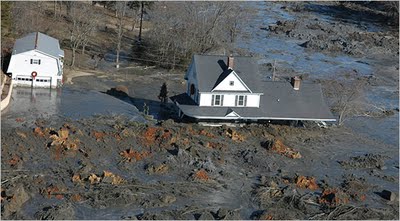Subscribe to
Posts [Atom]
Friday, December 04, 2009
Piles of Toxic Coal Ash Near You
 Bruce Henderson digs into Duke Energy's dirty legacy of coal ash deposits across North Carolina in today's Charlotte Observer ... which evokes certain memories of the Christmas TVA coal ash spill on the Tennessee River last year.
Bruce Henderson digs into Duke Energy's dirty legacy of coal ash deposits across North Carolina in today's Charlotte Observer ... which evokes certain memories of the Christmas TVA coal ash spill on the Tennessee River last year.Coal ash is known to be full of arsenic, mercury, and a dozen other ingredients fit for a witch's brew, and Duke Energy's coal-fired power plants produce tons and tons of it every year. In the NC-5, "Duke had to shut down an old ash landfill at its Belews Creek plant in Stokes County last year after groundwater samples repeatedly broke state safety standards."
Some 2.7 million tons (million tons) of Duke's ash was piled out on the ground between 1992 and 2003 without protective liners that are now required at landfills.
We ain't begun to calculate the true costs vs. benefits of corporatocracy.
And don't even get us started on the fact that much of that coal comes from mountaintop removal mines north of here.
Labels: coal industry, corporate power, Duke Energy, mountaintop removal coal mining
Wednesday, October 07, 2009
Arsenic and Old Ash
 The corporate gift that just keeps on giving! Some 13 coal ash ponds on the Yadkin, the French Broad, and five other North Carolina rivers are leaking arsenic, cadmium, chromium, and lead -- metals known to cause cancer, neurological problems and other serious illnesses -- at levels, in some cases, exceeding 380 times state groundwater standards.
The corporate gift that just keeps on giving! Some 13 coal ash ponds on the Yadkin, the French Broad, and five other North Carolina rivers are leaking arsenic, cadmium, chromium, and lead -- metals known to cause cancer, neurological problems and other serious illnesses -- at levels, in some cases, exceeding 380 times state groundwater standards.Three of the waste ponds border the Catawba, which supplies drinking water to the greater Charlotte metropolitan kingdom.
But, who cares, really? Don't coal ash ponds signal JOBS, JOBS, JOBS? So what if a few hundred people get weird cancers? Who'll ever prove it was because of the drinking water?
Labels: coal industry, corporate power, water resources
Tuesday, June 09, 2009
West Virginia Saved from "Scalia Justice"
 An important decision regarding the buying of judges was handed down yesterday by the U.S. Supremes in a 5-4 decision. Because the case involved the influence of Big Coal in the state of West Virginia, I've been following it for years and can only applaud the decision and note that Justices Scalia, Roberts, Thomas, and Alito (the minority in the decision) think it's perfectly all right to buy yourself a judge, if you've got the cash, and that the bought judge is perfectly within his rights to rule in your favor when the time comes.
An important decision regarding the buying of judges was handed down yesterday by the U.S. Supremes in a 5-4 decision. Because the case involved the influence of Big Coal in the state of West Virginia, I've been following it for years and can only applaud the decision and note that Justices Scalia, Roberts, Thomas, and Alito (the minority in the decision) think it's perfectly all right to buy yourself a judge, if you've got the cash, and that the bought judge is perfectly within his rights to rule in your favor when the time comes.Here's the background: Several small mining companies sued A.T. Massey Coal Company, alleging that Massey's chief executive, Don L. Blankenship, the Boss Hogg of the West Virginia coal industry, had used fraud to drive the small companies out of business. The plaintiffs won a $50 million jury verdict in 2002, which Blankenship appealed to the state's Supreme Court, where he lost in a 3-2 decision. Whereupon Blankenship found himself a lawyer willing to be his candidate in the next election, running against the state's Chief Justice, who cast the deciding vote against him, and spent $3 million in 2004 to defeat the Chief Justice and install his own guy, who promptly supplied the third vote in reversing the previous decision. Got that?
Which developments, ruled the five-judge majority on the U.S. Supremes yesterday, violate the Constitution's due-process clause. They've sent the case back to the West Virginia Supreme Court and ordered the Blankenship-bought chief justice to recuse himself from any further involvement.
Judge Scalia, who himself knows a thing or two about buddying up with Dick Cheney and then ruling in his favor, was particularly outraged that the majority on the court thinks it can "right all wrongs and repair all imperfections through the Constitution." That's the guy who helped appoint our president in 2000.
Labels: Antonin Scalia, coal industry
Saturday, November 29, 2008
The Last Crusading Newspaperman?
 I met "The Mountain Eagle" owner/publisher Tom Gish and his wife Pat several times, but I didn't really know them personally. Oh I KNEW them, but mainly from the pages of their crusading weekly paper published in Whitesburg, Kentucky. That newspaper had a huge following across all of Appalachia and nationally because it was at the epicenter of so much political ferment in our region, particularly the rising chorus against the national disgrace of strip mining. We returned from our Thanksgiving road trip to discover belatedly that Tom Gish died a little over a week ago in Pikesville. He was 82.
I met "The Mountain Eagle" owner/publisher Tom Gish and his wife Pat several times, but I didn't really know them personally. Oh I KNEW them, but mainly from the pages of their crusading weekly paper published in Whitesburg, Kentucky. That newspaper had a huge following across all of Appalachia and nationally because it was at the epicenter of so much political ferment in our region, particularly the rising chorus against the national disgrace of strip mining. We returned from our Thanksgiving road trip to discover belatedly that Tom Gish died a little over a week ago in Pikesville. He was 82.When Tom and Pat bought "The Mountain Eagle" in 1956, the motto on its masthead read "A Friendly Non-Partisan Weekly Newspaper Published Every Thursday." The Gishes changed the motto to "It Screams" and began actually covering the news, like what the elected officials were up to. Apparently, no newspaper reporter had ever attended meetings of the Letcher County Fiscal Court, the approximate equivalent of our County Commission. Those meetings turned out to be secret conclaves of good ole boys who took payoffs from the coal industry, and the Gishes began exposing the corruption. The local Fiscal Court promptly passed a resolution banning "The Mountain Eagle" from its meetings. "The Eagle" went anyway, and in the face of death threats helped push through the first open meetings law in Kentucky history.
The Gishes also investigated the local Whitesburg police force on accusations that they were harassing and even physically abusing teenagers. One result of that investigation was that a police officer paid arsonists to throw a kerosene firebomb through a window at the newspaper, destroying the building. A week later the Gishes published the paper from their front porch with the motto changed to "It Still Screams." Tom Gish said he later learned that coal company money was behind the crime.
Both Tom and Pat were absolutely fearless and determined to tell the truth no matter the cost. They were the enemies of "business as usual," which meant the rule of "a handful of very powerful interests who want to control every single thing in the county, no disagreements, no opposition, no hints of dissent to be tolerated — the old way of doing things — fire the coal miner who wants a union, don't re-hire the teacher who disagrees, take away the food stamps, the free medications, the welfare checks of anyone who dares express a thought of his own," as the Gishes would later characterize what they were up against.
In recent years they supported the political insurgency of reformer Carroll Smith (a Republican, incidentally) who ran for and won the office of Chief Judge Executive, the equivalent (more or less) of our County Commission chair. Smith successfully held that office for a couple of terms and then was defeated on a campaign of outrageous lies in 2006. But he was only defeated because his opponents (Democrats, incidentally) were "swift-boating" him and managed to buy up every newstand copy of "The Mountain Eagle" the week before the election because that edition of the paper printed the truth behind the lies. (Tom & Pat editorialized about that "nasty trick" a week later.)
I served with Tom and Pat on an advisory board that was helping Elizabeth Barret produce a documentary film about the murder of a Canadian filmmaker in Letcher County in 1967, a crime that put Letcher County in an unwelcome international spotlight and which the Gishes tended to see as yet another expression of a closed, corrupt political system.
"The Mountain Eagle" is now being edited by son Ben Gish, who's been at the helm for several years now. The paper, among its many accomplishments as a fearless beacon for journalistic truth, gave a start to many young reporters who went on to regional and national prominence. Several of them came back to Whitesburg to speak at Tom Gish's funeral.
We might not see Tom Gish's like again, at least not in rural Appalachia. We can, of course, always hope -- and pray -- that courageous journalists will rise perennial among our ranks, whether by means of old-fashioned news-print or through the so far unfettered and newfangled InnerTubes.
Labels: coal industry, Tom Gish
Friday, October 03, 2008
The Bosses Get a Clue
Last week a film crew from the National Rifle Association showed up at the Consol Blacksville #2 Mine in Monongalia County, West Virginia, and started cornering miners, trying to get some of them to speak out against Barak Obama.
This was not received well by the miners.
"This was a surprise visit," explained United Mine Workers Safety Chairman Eric Greathouse, "and a lot of the miners felt this was a direct slap in the face of the union because they were trying to coerce our people into saying things against Barack Obama."
"Consol doesn't let anybody on their property -- never," said Safety Committee Member Mark Dorsey, "and for them to let the NRA come on the property and solicit our membership was totally uncalled for. We made our endorsement to our political process, and we didn't bother them, and they shouldn't be harassing our membership over this."
Some 440 miners expressed their disapproval by failing to show up for work on Monday of this week, taking what's called a "Memorial Day," instead of going to work.
This was not received well by the miners.
"This was a surprise visit," explained United Mine Workers Safety Chairman Eric Greathouse, "and a lot of the miners felt this was a direct slap in the face of the union because they were trying to coerce our people into saying things against Barack Obama."
"Consol doesn't let anybody on their property -- never," said Safety Committee Member Mark Dorsey, "and for them to let the NRA come on the property and solicit our membership was totally uncalled for. We made our endorsement to our political process, and we didn't bother them, and they shouldn't be harassing our membership over this."
Some 440 miners expressed their disapproval by failing to show up for work on Monday of this week, taking what's called a "Memorial Day," instead of going to work.
Labels: Barack Obama, coal industry, National Rifle Association, union activity, United Mine Workers
